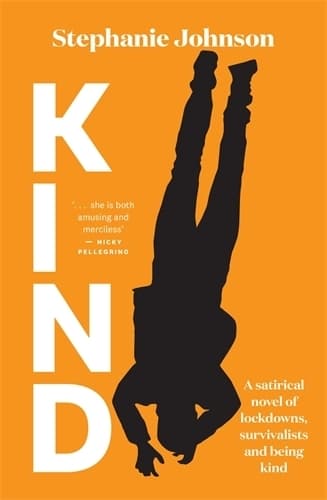Review: Kind
Reviewed by Linda Herrick
Stephanie Johnson, such a prolific, versatile and generous force in our literary landscape, delivered the keynote lecture at the 2021 Auckland Writers Festival, a year after the 2020 festival had been cancelled due to the arrival of the Covid pandemic. As part of the lecture, she was asked to forecast future themes in New Zealand fiction. Unsurprisingly, Johnson, who co-founded the Writers Festival in 1998, predicted a wave of work about the covid crisis.
Kind is her contribution to the pandemic genre. It’s a cross between a satire and a thriller that pivots around – before, during and after - that strange silent period of the first lockdown in March 2020.
The title echoes the fleeting surge of national collective goodwill during the shock shutdown when our then-PM urged us to be “kind.” And most of us tried.
But then, as Johnson makes clear, the resilience of kindness can erode when it collides with less altruistic instincts. That transition, the tipping over from good to bad, drives Kind’s intrigue, full of surprises to the very end.
What a tangled web Johnson weaves. Briskly driven by short chapters and multiple perspectives, Kind opens with a description of a man lying in the snow in the Southern Alps, “an exclamation mark on a white page.” The man, Lyall Hull, is a Christchurch National Party MP who has fled to the hills under some sort of fearful stress, deliberately leaving his phone behind.
Lyall is the estranged husband of Kerry Anne “K.A.” McAnulty who has moved to Russell to wait out the lockdown with her parents. Out at sea, in range of the Far North, bobs a small yacht carrying a group of foreigners who have bought an illegal passage into New Zealand. Delayed by a storm, the yacht also has an invisible guest, Coronavirus.
Another key figure, Joleen, K.A.’s foster sister, joins the family in Russell, but with her own agenda. Jolie is a nefarious gal, her history of wrongdoing slowly revealed in letters she sends to K.A. from Wiri Women’s Prison tracking ahead in time.
The letters expose Jolie’s sad, delusional thinking, including her quest for revenge against her former lover, Troy Slant. He was her boss at New Zealand’s ‘only remaining private TV station ... American-owned and on the market for years,’ which has a familiar ring. This gives Johnson the opportunity to blast the station’s abandonment of locally made drama and documentaries in favour of cheap imported ideas and reality TV. This too has a maddening, familiar ring.
Kind’s rollcall also includes a grotesque American lesbian couple hiding out in a bunker in the Alps, and Mick, a former undercover cop who goes looking for Lyall, his estranged mate. Johnson doesn’t devote too much time to physical descriptions of most of this motley crew, which perhaps makes the point that the veneer matters less than their moral backbone or lack thereof.
One of Kind’s most poignant aspects are the passages noting the remarkable side-benefits of the lockdown: the clean air, the peace and quiet, the streets stripped of cars. Here’s Lyall, in a DoC carpark in the mountains: ‘Over five million tourists expected this year ... Now there were none. The air smelt clean, so clean it squeaked and pinged in his sinuses.’
And Hugo, K.A.’s elderly father, goes for a run and stares across to Paihia: ‘When was this place ever not beautiful, even when it was over-run with tourists?’ he muses, to himself. ‘Buses, cars, campervans, six cruise ships a week – thousands of people absent. Joy, peace, clean air and Kiwi accents.’
Kind ends in 2023, in the cruel world we now have to deal with. After a startling twist, it turns out that Johnson’s book is deeper than a satire, or a thriller, but something much more tender – and reflective about what we have lost.
Reviewed by Linda Herrick
